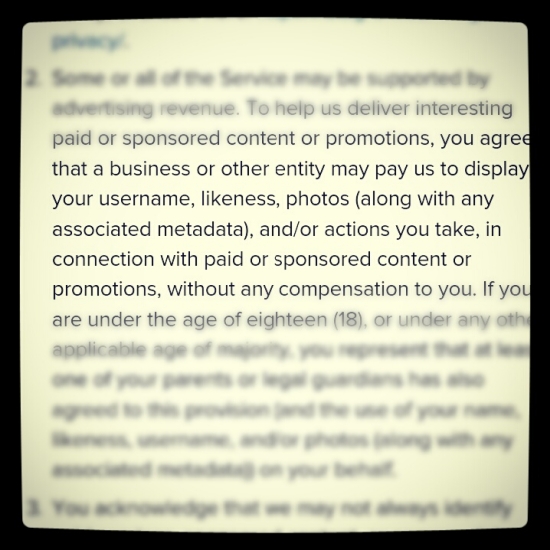Instagram Changes Terms of Use, Internet Goes Bonkers
 Remember that user agreement we all clicked through without reading when we signed up for Instagram? Yesterday they announced they were changing it, and someone actually read those changes, and then the Internet lost its hivemind over the new policy. Why so upset, Internet? It’s largely due to the fact that Instagram’s new policy, which goes into effect January 16th, allows them to sell any user photos they want without having to pay the owner of the picture. Is that really a big deal?
Remember that user agreement we all clicked through without reading when we signed up for Instagram? Yesterday they announced they were changing it, and someone actually read those changes, and then the Internet lost its hivemind over the new policy. Why so upset, Internet? It’s largely due to the fact that Instagram’s new policy, which goes into effect January 16th, allows them to sell any user photos they want without having to pay the owner of the picture. Is that really a big deal?
First of all, the anger at Instagram itself seems misplaced. The company is owned by Facebook now, so shouldn’t we all be mad at them? On Instagram’s new privacy page they say the new policies are intended to highlight that collaboration. But before I go on, here’s the piece of the terms of service that everyone is so passionately objecting too. I even Instagrammed it for you:
Facebook sort of already does this. They use photos and data about users to target ads to that user’s friends. My friends on Facebook could see an add with my smiling face that reads “Glen Tickle likes Geekosystem,” but the way Facebook manages these ads seems more tasteful than the way Instagram has worded their intentions here.
My friends seeing an ad that hawks a product or service I have actively said I like is different than suddenly seeing the picture I took at dinner being used on a restaurant’s website. Especially when someone got paid for that photograph, and that person isn’t me, the one that took it.
With Facebook’s newest changes to their own policies they’ve said they will start using data from users for ads outside of Facebook. A pertinent piece of the new Facebook policy reads as such:
For content that is covered by intellectual property rights, like photos and videos (IP content), you specifically give us the following permission, subject to your privacy and application settings: you grant us a non-exclusive, transferable, sub-licensable, royalty-free, worldwide license to use any IP content that you post on or in connection with Facebook (IP License). This IP License ends when you delete your IP content or your account unless your content has been shared with others, and they have not deleted it.
That basically means “that a business or other entity may pay us to display your username, likeness, photos (along with any associated metadata), and/or actions you take, in connection with paid or sponsored content or promotions, without any compensation to you.” Sound familiar?
So why is everyone so upset about the change to Instagram, but not to Facebook? Could it be simply that it’s worded in a way that’s more easy to understand?
It’s more likely that the Facebook policy mentions that what it will share is still controlled by a user’s privacy settings. It isn’t going to take a photo you have only shared privately and put it on a billboard somewhere, but the new Instagram policy doesn’t make any similar promises. If you post something on Instagram, they say they can use it, regardless of settings.
With the backlash from users, it’s not unlikely that we’ll see a revision of the policy by Instagram within the next few days. I would expect them to still sell users photos, but with a way for people to opt out, or at the very least exclude private pictures. In fact, I’d like to see a draft on my desk by tomorrow morning.
A lot of users have posted on Twitter that they intend to delete their Instagram accounts, which appears to be the only way to truly opt out at the moment. I’m still on the fence, but if I do keep my account active, I’ll certainly think twice about what I’m posting.
(via Instagram, Facebook, image via kyrani)
- Facebook held a vote on its new policy, but no one voted
- Instagram broke up with Twitter
- Everyone Instagrammed their Thanksgiving meal. Everyone
Have a tip we should know? [email protected]
